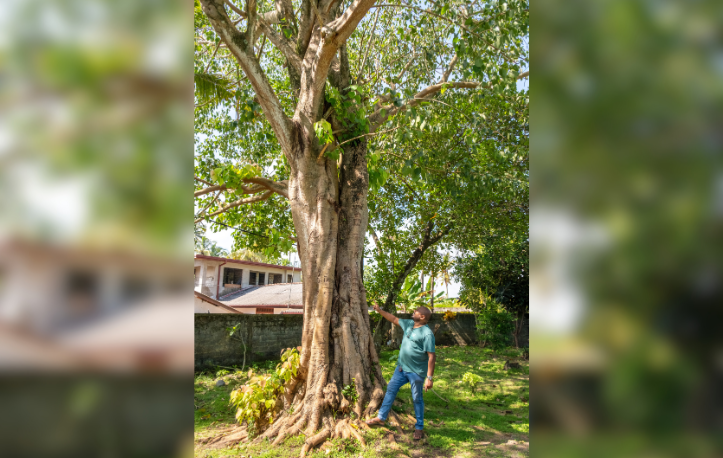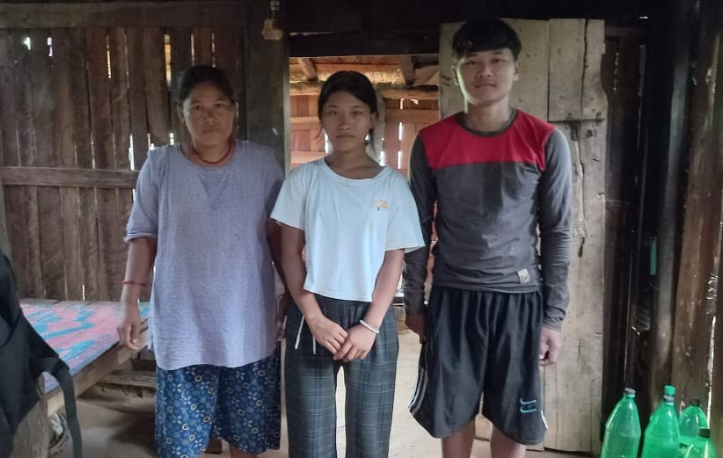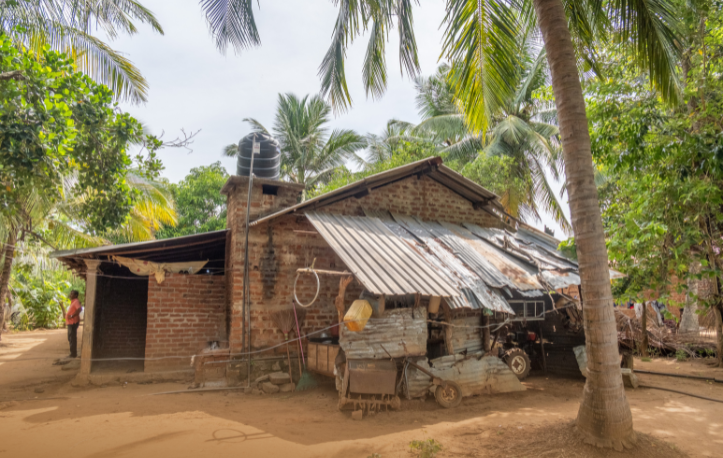With a bare pantry and no money to buy food, Chaminda and Janani took a walk to a nearby beach one afternoon, praying as they walked. No sooner had they finished praying than they saw a large fish flopping on the shore. After chasing their excited dog away, they gratefully retrieved their three-kilogram dinner. Today, they recall that incident as an example of God’s provision through 19 years of opposition and persecution.
Entering Christian ministry in a part of Sri Lanka dominated by radical, nationalistic Buddhists is a bold act of faith, especially when complicated by a lack of adequate financial support. But as a young married couple committed to proclaiming the gospel, Chaminda and Janani trusted in God and took the challenges in their stride.
The island nation of Sri Lanka, off the southeast coast of India, has strong churches and theological training programmes that serve the 10% Christian minority. Still, 70% of the population is Buddhist, and there are areas in the south where the overwhelming Buddhist majority is fiercely opposed to Christianity; a pastor was martyred there in 1988 for trying to introduce the gospel. It was into this region that Chaminda and Janani felt called to plant churches.
Swept Away
In 2004, Chaminda and Janani were leading a small church in their home. Since being married and beginning ministry work three years earlier, they had already been evicted several times by landlords yielding to pressure from Buddhist monks who taught that Christians brought shame to the community. But Chaminda and Janani had managed to find a place not too far from the beach, near the city of Galle, and a group of 20 to 30 Christians had begun gathering with them there for prayer and worship.
The church decided not to meet on Sunday, 26 December 2004, because they had held a Christmas service the previous day. So Chaminda and Janani took the opportunity to celebrate Christmas with Chaminda’s family, who lived farther inland.
That Sunday morning, a massive earthquake in the Indian Ocean triggered the largest tsunami in recorded history. A 12-metre wave struck the southern Sri Lankan coast, killing more than 35,000 people and devastating entire communities, including the one where Chaminda and Janani lived.
When the couple returned home, they immediately focused on helping their community recover. Chaminda’s family sent them food and water, which they shared with their neighbours as much as possible.
Soon, an international Christian relief team arrived to work alongside them. Deeply moved by Chaminda’s commitment to stay and serve in an area that had been so opposed to the gospel, a leader of the relief organisation asked him, “What do you need?”
Still focused on serving his neighbours, Chaminda pointed out the overwhelming needs of the community. So the man clarified his question. “No, I asked you what you need,” he said. “Chaminda, we want to bless you. What do you need?”
Chaminda told the relief worker that what he really wanted was to build a church in the area, which still had almost no Christian witness. Before the team left, they helped Chaminda purchase a piece of land with an old house on it. A new church would eventually be built on the land, but not before a wave of opposition threatened to take away the house.
Staking a Claim
Chaminda, Janani and some friends were working on renovations in the house shortly after the land purchase, when a mob of almost 1,000 people marched up the narrow, unpaved street towards their property. Buddhist monks had called on area residents to eliminate the shame of having Christians in their community.
As the mob gathered, they began to tear down a perimeter wall and gate. Once they had breached the wall, they poured into the property. They beat 10 church members with iron bars and their fists, and three of the Christians, including Chaminda, were hospitalised.
“I just tried to escape,” Chaminda recalled. “I was able to close the door, but they broke the door and came inside and caught us. They started beating and dragging us towards a Buddha statue over at the corner [of the street]. I was swollen, the whole body from head to toe.”
The crowd damaged walls, doors and windows in the house as well as the Christians’ vehicles parked on the property. When a fight broke out between some of the attackers over money they had stolen, Chaminda, Janani and the other church members escaped.
While the Christians waited for the situation to calm down, one of the Buddhist monks entered the property to set up a Buddhist shrine and plant a bodhi tree, which is sacred in Buddhist culture and is not supposed to be cut or uprooted. Planting the tree was the Buddhists’ way of claiming spiritual authority over the land.
As a result of legal proceedings related to the attack on their property, Chaminda and Janani were temporarily prohibited from returning to the land or house. They also learned that they were forbidden from moving away, meaning they couldn’t leave for better jobs or family needs for the duration of the legal proceedings. In the meantime, homeless people with drug addictions and criminal backgrounds took up residence in the house.
“The court case went for five years,” Janani said. “But we did our ministry. We were praying, and we were having classes and prayer meetings and Sunday services at our [rented] house.” The harassment continued, however, even at their house. “It was a continual thing,” Janani said.
“When we were there, every night … they would throw stones, hit the vehicle and destroy flower pots around the house. It was normal.”
Tired of the derelict property and the activities of those living there, neighbourhood leaders complained frequently to authorities. Ultimately, those who had attacked the Christians asked to settle the case. Chaminda agreed, surprising his Buddhist opponents by waiving his right to restitution for the damage they caused.
“This was a great opportunity,” Chaminda said. “These people in the community, they didn’t want us to even enter the house. But now they are saying, ‘Come and stay here.’ So we took that opportunity.”
He said he believes it was God’s plan for the aggressors to see the love of Christ in the circumstances.
Chaminda and Janani moved into the house 20 days after settling the case, but they continued to hold worship services in their rented house to avoid antagonising their neighbours.
While their efforts brought temporary peace, two years later, in 2012, a group of Buddhist monks again began protesting against their presence. The church stopped meeting as a large group, instead dividing into five groups that met at different times and places. At one point, a group of 40 monks, including one carrying a handgun, burst into the house and assaulted Chaminda. They tried to file false charges against him, but the police rejected their accusations.
Then, one evening, a group of five young men forced their gate open and confronted Chaminda and two church leaders in the yard. They had devised a plan to frame Chaminda for the assault of another young man earlier that day. Chaminda was again badly beaten and required medical care at a local hospital.
Less than a week later, he received a summons to appear at the police station. On the day before his scheduled appearance, a monk went through the community with a loudspeaker, crying, “[The pastor] is a devil! Gather to chase him out from our village!” More than a thousand people responded to his cry and gathered around the police station, ready to lynch Chaminda.
But a high-ranking police officer had called Chaminda and told him not to come to the station. A few hours later, the charges against him were dropped.
Growing Family, Growing Church
Later in 2012, Janani gave birth to a baby boy. The child, named Oshan, wasn’t hitting milestones or making sounds that would be expected in a baby his age. Doctors soon determined that he had neurological differences, which they attributed to the long-term stress Janani suffered as a result of the recurring attacks.
Chaminda and Janani’s concerns grew as doctors and specialists failed to find therapies that helped Oshan, and the doctors finally recommended that the family go abroad for help. But Chaminda was torn.
“I am a father, same as I am a minister,” Chaminda said. “I know that God is calling me to [this town], but sometimes I am struggling with what to do, because my son is like this and I only have one son. If I die, he doesn’t have a brother to take care of him.”
When a front-line worker learned of Oshan’s medical needs, he helped Chaminda and Janani find therapies that greatly improved Oshan’s condition. Just as Oshan has grown and begun to reach important milestones, so has the church.
“Even though it was difficult, now the church has grown to 300 people,” Chaminda said. The congregation built a church building on the once-disputed property, and in 2024 they planted three new churches in the area.
“Everyone in the town knows the church,” Chaminda said with a laugh, “because we have been famous from the persecution. Persecution is not an obstacle. It created a platform for us to bring Jesus to more people.”
Anti-Christian sentiment still exists in the community. For example, the city has refused to seal their road, and local Buddhists still throw stones at their house. But Chaminda’s good reputation has led to an unexpected invitation; he has been asked to serve as a representative on a local committee.
Although the family home and beautiful church sit in the shade of the bodhi tree that has grown on the property since the first attack, the spiritual ownership is clear: This is a family and plot of land dedicated to the worship and proclamation of Jesus Christ.



Submit a Prayer